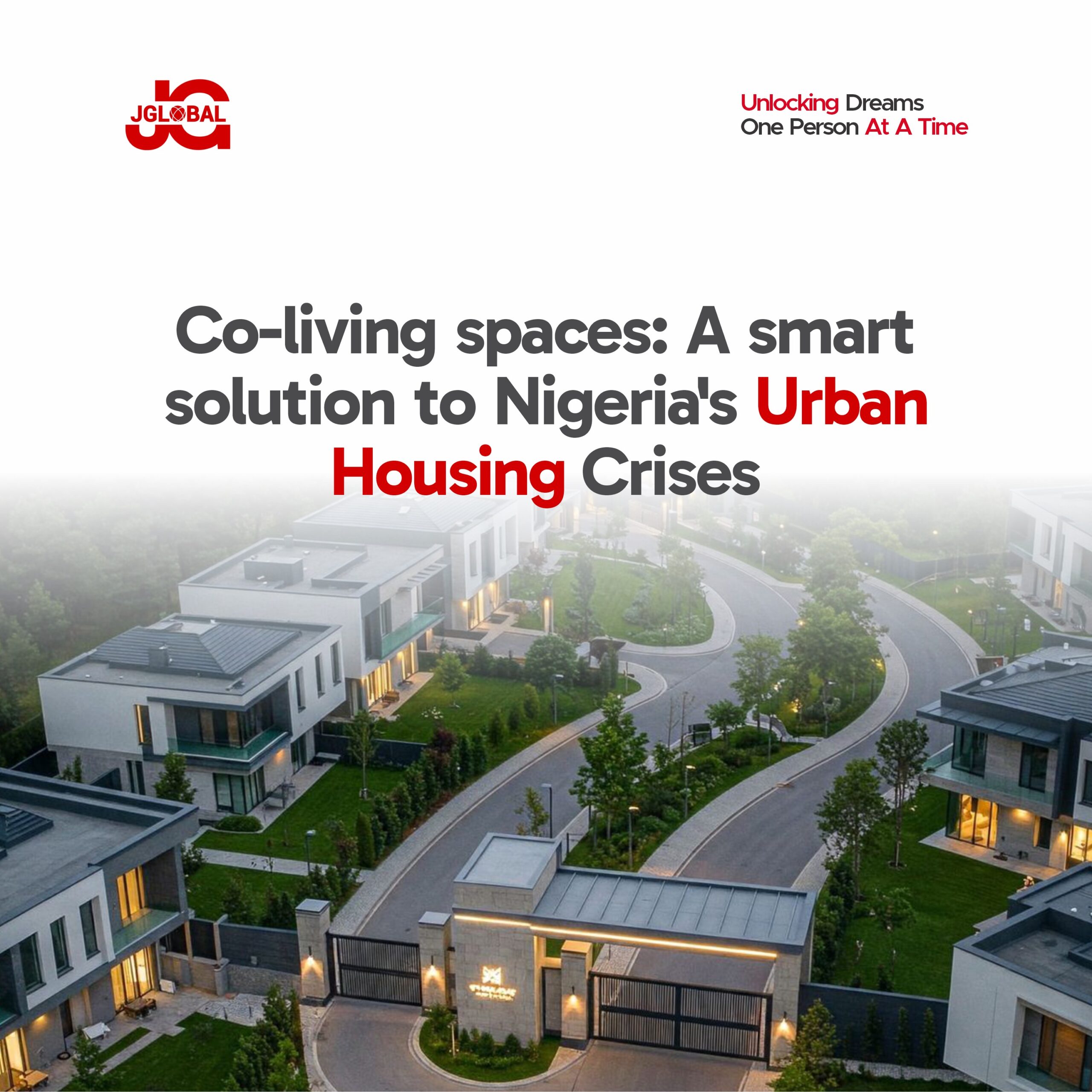Co-Living Spaces: A Smart Solution to Nigeria’s Urban Housing Crisis

Co-living spaces in Nigeria are fast becoming practical answers to one of the country’s biggest problems, affordable urban housing. With Nigeria’s housing deficit now estimated at over 28 million units and rent prices in cities like Lagos, Abuja, and Port Harcourt climbing higher every year, more people are being priced out of decent homes.
Young professionals, students, and even small business owners are now turning to co-living spaces in Nigeria as a cheaper, more flexible option. Instead of paying huge rent bills alone, they share modern apartments, split utility costs, and still enjoy comfort, community, and convenience.
In a country where owning or renting a home for the average income earner feels almost out of reach, co-living offers a refreshing alternative, one that’s redefining how Nigerians live, connect, and afford city life.
What Are Co-Living Spaces?
Co-living spaces in Nigeria are modern housing setups where people share a home but still have their own private rooms.
Instead of renting an entire apartment alone, you live in a shared space with others and split the cost of rent, electricity, and other utilities. Each person gets a personal room, while common areas like the kitchen, living room, or laundry are shared.
Most co-living spaces in Nigeria come fully furnished and ready to move in. You’ll usually find things like WiFi, stable power, cleaning services, and even shared lounges or work areas. The goal is to make life in busy cities more affordable and less stressful.
Co-living spaces in Nigeria offer comfort, convenience, and community all in one place. You save money, meet new people, and still enjoy the privacy of your own room without worrying about the heavy costs that come with traditional renting.
Why Co-Living Spaces In Nigeria Are Becoming Popular
Here are several reasons co-living spaces in Nigeria are smart solution for the housing crisis:
- Affordability
Co-living allows multiple people to share rent, utility costs, and amenities. Compared to renting a full flat alone in cities, co-living space can reduce your monthly cost significantly. In many cases, shared rooms are 20–35% cheaper than studios or one-bedroom apartments. - Flexibility
Many co-living spaces in Nigeria offer flexible lease terms you don’t have to commit for long if your work contract or studies are temporary. That makes them ideal for people who move often or aren’t ready for long-term housing commitments. - Community and Well-being
Living in shared spaces gives social support. It’s easier to meet people, share experiences, and build connections. This helps reduce isolation for newcomers, young professionals, or students moving away from home. Co-living spaces often organize events, shared meals, etc. - Efficient use of space and resources
Co-living encourages shared resources, maybe a common kitchen, shared electricity, or communal lounges. This not only saves money for residents but also reduces environmental impact. Less waste, fewer duplicate utilities, better usage of space. - Addresses housing supply gap
With Nigeria’s housing deficit so large, co-living spaces in Nigeria help to stretch what housing already exists, and create more units usable by more people. Converted or purpose-built co-living units can fill in part of the demand especially in major cities.
What you should know about the Lekki Avana project
Challenges of Making Co-Living Spaces Work in Nigeria
Even though co-living spaces in Nigeria are solving real housing problems, there are still a few bumps along the way.
- Legal and regulatory issues:
Many co-living setups still operate informally, that is, without proper tenancy agreements, safety checks, or government approvals. This can lead to confusion, disputes, or even eviction if things aren’t done right.
- Privacy concerns:
Not everyone likes sharing. Some people feel uncomfortable using shared kitchens or bathrooms, or they worry about noise and personal space. Finding the right balance between community and privacy is a big challenge.
- Quality and maintenance:
If the property isn’t well-managed… like cleaning, repairs, furniture, and electricity, the whole experience will become frustrating. Comfort and upkeep are key to making co-living spaces in Nigeria truly work.
- Social perception:
Many Nigerians still see co-living as “less than ideal.” They prefer the idea of having their own apartment, even if it means paying more. Changing this mindset will take time and good examples of how co-living can actually improve quality of life.
How Co-Living Spaces in Nigeria Can Scale to Help Cities
If done right, co-living spaces in Nigeria can become a major part of the solution to the country’s growing housing crisis especially in cities like Lagos, Abuja, and Port Harcourt where rent keeps rising and space is limited.
Here’s how we can make co-living work better and scale it sustainably:
- Encourage formal development by trusted developers
Right now, many co-living projects are run by small private operators. To make a real impact, big real-estate developers need to get involved by building purpose-designed co-living estates with proper infrastructure, safety systems, and amenities.
Some Nigerian developers are already experimenting with this model in 2025, combining smart housing design with flexible community living, especially in urban hubs like Lekki and Yaba.
- Offer flexible and affordable payment options
One major reason co-living appeals to young people is affordability. To expand its reach, operators can introduce monthly rent plans, short-term leases, or pay-as-you-stay models. Thus removing the barrier of huge upfront payments or rigid one-year commitments.
- Prioritize reliable infrastructure
Co-living won’t thrive without stable power, water, and internet. Government and private investors should focus on improving urban infrastructure and co-living developers can integrate renewable energy (like solar systems) to keep costs low and ensure steady electricity.
- Promote sustainable design and green living
To make co-living future-ready, estates should include eco-friendly materials, energy-efficient buildings, recycling systems, and shared utilities. This approach doesn’t just save costs, it reduces environmental impact and promotes community well-being.
- Clear policies and regulation
There’s currently little legal clarity around co-living in Nigeria. Local governments can help by creating specific housing policies, zoning approvals, and tenant rights frameworks that recognize and support co-living spaces. This will attract investors and protect both operators and residents.
- Foster community and trust
Finally, co-living isn’t just about shared rent. it’s about shared experience. Operators can organize community events, networking meetups, and wellness activities to help residents connect and feel at home.
If these steps are taken, co-living spaces in Nigeria could become more than a trend, they could reshape how cities grow, making urban living more affordable, social, and sustainable for millions of Nigerians.
Conclusion
If Nigeria’s urban housing crisis is going to ease, solutions like co-living spaces Nigeria are among the most promising. They bring down cost, build community, allow flexibility, and use resources better. For many people such as young professionals, students, or anyone priced out of traditional rentals, co-living offers a real, workable option.
For city planners, developers, and investors: co-living isn’t just a trend; it’s a chance to be part of solving a big problem. And for individuals looking for a place to call home, co-living spaces Nigeria might be just what you need.




I enjoy what you guys are up too. This type of clever work and reporting! Keep up the superb works guys I’ve you guys to my own blogroll.
I just like the valuable info you provide to your articles. I will bookmark your blog and check again right here frequently. I’m slightly sure I’ll be told many new stuff right here! Best of luck for the next!